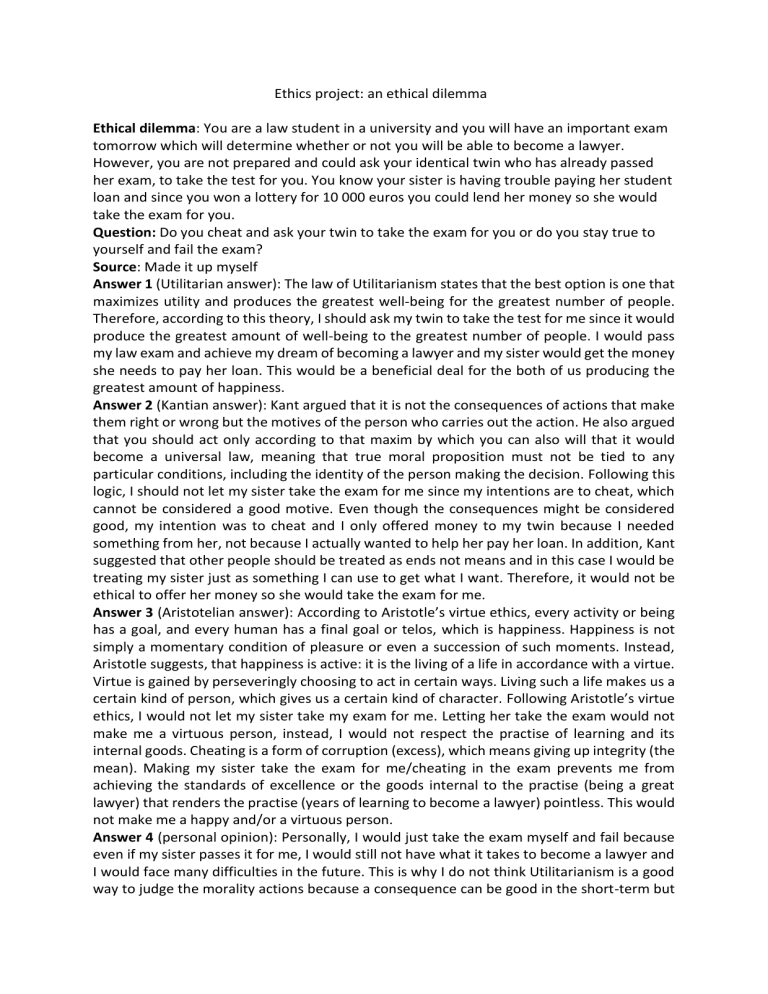
Ethics project: an ethical dilemma Ethical dilemma: You are a law student in a university and you will have an important exam tomorrow which will determine whether or not you will be able to become a lawyer. However, you are not prepared and could ask your identical twin who has already passed her exam, to take the test for you. You know your sister is having trouble paying her student loan and since you won a lottery for 10 000 euros you could lend her money so she would take the exam for you. Question: Do you cheat and ask your twin to take the exam for you or do you stay true to yourself and fail the exam? Source: Made it up myself Answer 1 (Utilitarian answer): The law of Utilitarianism states that the best option is one that maximizes utility and produces the greatest well-being for the greatest number of people. Therefore, according to this theory, I should ask my twin to take the test for me since it would produce the greatest amount of well-being to the greatest number of people. I would pass my law exam and achieve my dream of becoming a lawyer and my sister would get the money she needs to pay her loan. This would be a beneficial deal for the both of us producing the greatest amount of happiness. Answer 2 (Kantian answer): Kant argued that it is not the consequences of actions that make them right or wrong but the motives of the person who carries out the action. He also argued that you should act only according to that maxim by which you can also will that it would become a universal law, meaning that true moral proposition must not be tied to any particular conditions, including the identity of the person making the decision. Following this logic, I should not let my sister take the exam for me since my intentions are to cheat, which cannot be considered a good motive. Even though the consequences might be considered good, my intention was to cheat and I only offered money to my twin because I needed something from her, not because I actually wanted to help her pay her loan. In addition, Kant suggested that other people should be treated as ends not means and in this case I would be treating my sister just as something I can use to get what I want. Therefore, it would not be ethical to offer her money so she would take the exam for me. Answer 3 (Aristotelian answer): According to Aristotle’s virtue ethics, every activity or being has a goal, and every human has a final goal or telos, which is happiness. Happiness is not simply a momentary condition of pleasure or even a succession of such moments. Instead, Aristotle suggests, that happiness is active: it is the living of a life in accordance with a virtue. Virtue is gained by perseveringly choosing to act in certain ways. Living such a life makes us a certain kind of person, which gives us a certain kind of character. Following Aristotle’s virtue ethics, I would not let my sister take my exam for me. Letting her take the exam would not make me a virtuous person, instead, I would not respect the practise of learning and its internal goods. Cheating is a form of corruption (excess), which means giving up integrity (the mean). Making my sister take the exam for me/cheating in the exam prevents me from achieving the standards of excellence or the goods internal to the practise (being a great lawyer) that renders the practise (years of learning to become a lawyer) pointless. This would not make me a happy and/or a virtuous person. Answer 4 (personal opinion): Personally, I would just take the exam myself and fail because even if my sister passes it for me, I would still not have what it takes to become a lawyer and I would face many difficulties in the future. This is why I do not think Utilitarianism is a good way to judge the morality actions because a consequence can be good in the short-term but bad/harmful in the long-term. In fact, in this case it could be disastrous for my future since someone could find out that I cheated and my career would be ruined forever. It is better to stay true to yourself and accept failure as a natural part of life. Moreover, in my opinion it is wrong to use a family member like that and offer money to get what you want. Wanting to help another person should be genuine, not based on your own needs. If our only incentive to do good in the world was our own merit, then there would be no place for loyalty, trust and love.


